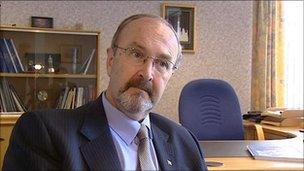Report on Police Ombudsman's office 'most critical ever'
- Published

Police Ombudsman Al Hutchinson has insisted his office is fully independent
Fractured, inconsistent and dysfunctional.
Not the independent verdict any senior manager would wish to read about the organisation he leads.
Especially when they called in the inspectors who reached the conclusions.
Police Ombudsman Al Hutchinson must have developed a thick skin in recent months.
This is the third highly critical report to be published since the BBC revealed in April that the chief executive of the police ombudsman's office had announced his intention to to resign, and delivered withering criticism about the way it functions.
In a letter explaining his decision to quit his £90,000 a year job, Sam Pollock claimed there had been political interference in the work of the office, and a lowering of operational independence between it and the PSNI.
His allegations led to two separate official inquiries.
Rejecting the criticism, Mr Hutchinson asked Dr Michael Maguire of Criminal Justice Inspection (CJI) to investigate the claims about a lowering of independence.
The ombudsman clearly hoped for a different verdict to the one that has been delivered.
This report published on Monday is perhaps the most critical ever to be produced by CJI.
It concludes that there "has been a lowering of the operational independence" of the office in the way it conducts investigations into historical cases.
Indeed, the inspectors say the ombudsman should suspend historical investigations.
'Bombing of McGurk's bar'
Inspectors examined a number of historical cases in which the ombudsman was asked to investigate allegations that the RUC had failed to properly investigate murders during the Troubles.
They included the UVF bombing of McGurk's bar in north Belfast in 1971, in which 15 people died.
The report describes the investigative processes as flawed and says inspectors found that a number of reports - including the one on McGurk's - had been altered before publication to reduce criticism of the police, with no explanation.
"Inspectors could not find any supporting rationale for the changes other than the differing interpretation of sensitive intelligence material," it adds.
" In some cases ....the reasons for changes are unclear even to those conducting the investigation."
The report also notes concerns by some senior staff about the way sensitive intelligence information is handled by the office's Confidential Unit, with some investigators claiming material was withheld.
An internal review of how this sensitive material is handled was conducted by a team consisting entirely of serving police officers from England and Wales, with no input from civilian members of the oversight team.
"Inspectors found there had been no significant consideration of the needs of a civilian oversight body as opposed to the needs of the police or security service," the report states.
As a result of concerns about the handling of intelligence material, inspectors reveal that two very senior members of the ombudsman's staff had asked to be disassociated with some reports.
The senior management team is described as dysfunctional, with "a serious lack of trust between many senior staff and little confidence amongst directors and some investigators in how historic cases are dealt with."
It is all far from the glowing endorsement Mr Hutchinson must have hoped for when he called the inspectors in.
Historical cases account for just 20% of the work conducted by the ombudsman, but they are the most controversial and account for most of the public comment, good and bad, that the office attracts.
"In the context of Northern Ireland, the perception of independence as well as its reality is critical," the inspectors say.
Mr Hutchinson has insisted that his office is fully independent, but this report says otherwise.
This indictment comes just two months after another official report was highly critical of the way the office of the ombudsman functions.
Former senior civil servant Tony McCusker was appointed by Justice Minister David Ford to examine Sam Pollock's claims about political interference.
'Turmoil'
While Mr McCusker said there had been some interference, he concluded that there was no evidence that it was "systemic".
But he painted a picture of an office in turmoil, and said there was a lack of leadership.
Human rights group the Committee on the Administration of Justice has also published a critical report, questioning the office's independence from the police and the Northern Ireland Office.
Mr Hutchinson has faced calls for his resignation, with critics saying his continued presence is damaging public confidence in the office he leads.
The man at the centre of the storm insists he is going nowhere, and that he can address the many problems that have been identified. The question is, will he get the time to deliver?
- Published15 August 2011
- Published16 June 2011